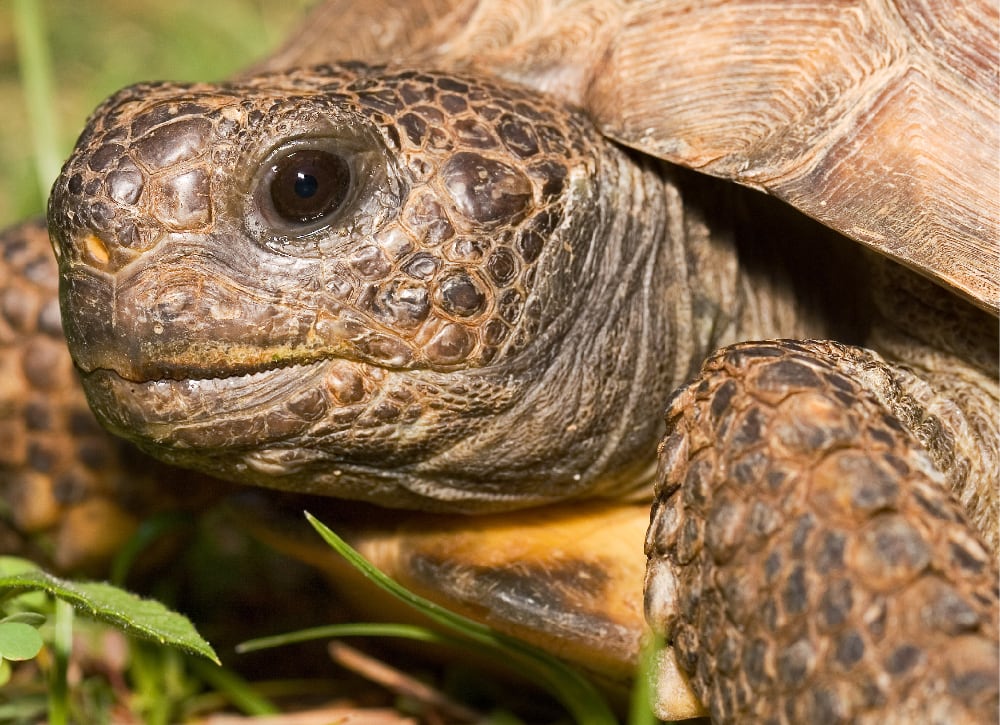As a proud tortoise owner, you know your reptile needs good nutrition to stay healthy and well but what does a balanced, complete tortoise diet includ
As a proud tortoise owner, you know your reptile needs good nutrition to stay healthy and well but what does a balanced, complete tortoise diet include?
“Tortoises need foods that are appropriate for their species, age and lifestyle,” said Dr. Nichole Huntley, Mazuri nutritionist. “It’s also important to ensure they’re receiving nutrients in the correct amounts, a detail easily overlooked.”
Make sure your tortoise’s diet is on target with these three nutrition tips.
1. Design the diet according to your species of tortoise.
Different tortoise species have different dietary needs.
“Do a little research and learn about the natural origins of your tortoise and its specific nutritional needs. This will help you provide your pet with an optimal diet,” suggested Dr. Huntley.
Below are three kinds of formulas you can look for to meet the needs of different species and ages of tortoises:
- Low-Starch, Herbivorous Diet: Formulated for arid-zone and grass-eating herbivorous tortoises, like desert, sulcata and leopard, that need a low-starch, high-fiber diet.
- Omnivorous Diet: Formulated for forest, tropical and omnivorous tortoises, like the Burmese and Indian-star, elongated and red-footed tortoises that need a high-fiber diet with more protein.
- Low-Starch Diet For Small Tortoises: Low-starch diet designed with higher protein for growing tortoises less than 1 year old.
2. Ensure your tortoise’s diet includes the five basic elements.
All tortoises, regardless of species, have five basic nutritional needs that must be met.
- Water: Tortoises need fresh, clean water to drink as well as some to soak in, especially on warm days.
- Protein: Protein supports essential functions like developing and maintaining muscles and building antibodies. Providing the proper amount of protein through a pelleted diet to growing reptiles can prevent conditions like pyramiding, the build-up or stacking of keratin in the tortoise’s shell.
- Energy: Often referred to in calories, energy is important even for slow movers like tortoises. Younger tortoises need more than older ones but be cautious about adding too much energy in the form of starch or sugar for grass-eating, herbivorous tortoises. Choose a low-starch, high-fiber pelleted diet to meet their needs.
- Vitamins and minerals: They are essential for maintaining health and preventing issues like metabolic bone disease. Pelleted tortoise food formulated with a 1:1 to 2:1 dietary calcium to phosphorus ratio will deliver the balanced minerals your tortoise needs. Look for feeds with antioxidants, vitamins E and A to support your pet’s immune system and eye health.
- Grass hay and treats: Greens and veggies are also important dietary considerations. Good quality grass hay should always be available for your tortoise. Raw veggie treats add variety and are a fun way to bond with your tortoise. However, a pelleted tortoise diet should make up most of your tortoise’s food. Choose one that is formulated to allow feeding with healthy snacks.
 3. Feed the proper amount for your tortoise’s size and species.
3. Feed the proper amount for your tortoise’s size and species.
Tortoises typically consume 1-4% of their bodyweight in food per day. Depending on the size and activity level of your tortoise, they may fall into the lower or higher range. Larger tortoises will consume a smaller percentage of their body weight, while smaller or juvenile tortoises will fall into the higher range.
“This estimate is a good place to start, but it is always important to adjust the amount you’re feeding based on the animal’s body condition and eating behavior,” says Dr. Huntley.
Mazuri’s pelleted tortoise foods are balanced for protein and energy to meet all nutrient requirements, including calcium and phosphorous when fed at proper levels, so no additional supplementation is required. Find the perfect fit for your tortoise at Mazuri.com.



